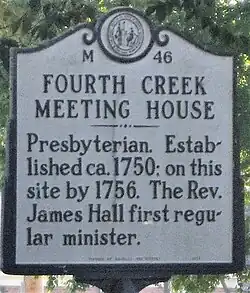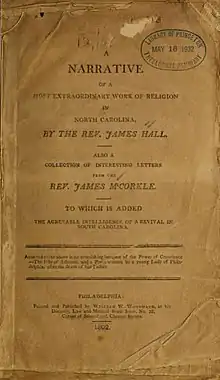James Hall (minister)
Rev. James Hall, D.D. (August 22, 1744 – July 25, 1826) was a Presbyterian minister, chaplain in the Rowan County Regiment during the American Revolution, educator, and missionary in the Natchez area of the Mississippi Territory. He helped to found the Fourth Creek Congregation as its second minister. He was the first minister of Concord Presbyterian Church and Bethany Presbyterian Church in Iredell County, North Carolina on April 8, 1778.[1][2][3][4][5][6][7][8][9][10][11][12]
Rev. James Hall, D.D. | |
|---|---|
 | |
| Born | August 22, 1744 Carlisle, Pennsylvania |
| Died | 1789 July 25, 1826 (aged 81) Iredell County, North Carolina |
| Place of burial | 35°51′43″N 80°50′41″W |
| Allegiance | United States of America |
| Service/ | North Carolina militia |
| Years of service | 1776-1776 |
| Rank | Chaplain |
| Unit | Salisbury District Brigade, Rowan County Regiment |
| Awards | Honorary Doctor of Divinity from Princeton University and University of North Carolina |
Early life
James Hall, Jr. was born in Carlisle, Pennsylvania. His parents were James and Prudence Roddy Hall. His father was a Scotch-Irish immigrant. James Hall, Jr. had four brothers. In 1751, the Hall family migrated to North Carolina and settled in the area of Fourth Creek in what was then Rowan County, North Carolina. He received an early education locally and may have attended the Crowfield Academy of Centre Presbyterian Church. For a time he considered marriage but instead decided to devote his life solely to the ministry.[2][11]
Due to his father's ill health, his higher education was delayed. He attended the College of New Jersey at Princeton, where he studied theology under John Witherspoon. He was graduated in 1774. He was licensed to preach in late 1775 or early 1776 by the Orange Presbytery.[2]
Ministry

On April 8, 1778, the Reverend James Hall was confirmed as the second minister and first full time minister of the Fourth Creek Congregation, as well as Concord Presbyterian Church and Bethany Presbyterian Church .[2]
American Revolution
Rev. Hall was Chaplain of the Salisbury District Brigade and probably also the Rowan County Regiment, which was subordinated to this Brigade. He often used his pulpit to assist in raising troops for these North Carolina militia units. He may have also been involved in the Cherokee Expedition in 1776. (Note: There was also another James Hall in the Salisbury District Regiment, who was a captain and major. This James Hall was killed at the Battle of Cowan's Ford).[13][2]
Teaching and missionary career

In his missionary pursuits, he made over fourteen expeditions to the west and southwest. In 1800, he established the first protestant mission in Natchez, Mississippi. In 1801, he published a book on articles that he had written on this area of Mississippi, A brief history of the Mississippi Territory, to which is prefixed a summary view of the country between the settlements on Cumberland River & the territory. He also wrote a book, A narrative of a most extraordinary work of religion in North Carolina.[2][1]
When he was a young minister, he founded Clio's Nursery/Academy about ten miles north of Statesville, North Carolina in about 1778 and the Ebenezer Academy near his home north of Statesville. He may have also published a grammar for use by his students.[2][14]
He was an active supporter of his alma mater, Princeton University, and the University of North Carolina. Both schools conferred an honorary doctor of divinity on him.[2][12]
Death
Rev. Hall lived in the area of the Bethany Church. After serving the three churches for 12 years, he decided to devote himself to Bethany, where he served for an additional 26 years and retired as pastor in 1816. He died on July 25, 1826, and was buried at the Bethany Presbyterian Church cemetery.[2][15]
References
- Hall, James (1802). A narrative of a most extraordinary work of religion in North Carolina, by the Rev. James Hall : also a collection of interesting letters from the Rev. James M'Corkle ; to which is added the agreeable intelligence of a revival in South Carolina. Philadelphia : William W.Woodward. Retrieved August 17, 2019.
- Weist, Timothy J. (1988). "James Hall". NCPedia. Retrieved August 16, 2019.
- Dictionary of American Biography: Under the Auspices of the American Council of Learned Societies. Vol. 4. Scribner's Sons. 1960.
- Foote, W. H. (1846). Sketches of North Carolina, Historical and Biographical. New York, R. Carter. pp. 315-336.
- Hunter, C. L. (1877). Sketches of Western North Carolina. pp. 196-202.
- Rumple, Jethro (1966). The History of Presbyterianism in North Carolina.
- Sprague, W. B. (1858). Annals of the American Pulpit. Vol. 3.
- Stone, R. H. (1970). A History of Orange Presbytery, 1770–1970.
- Who Was Who in America, 1607–1896. 1963.
- McGeachy, Neill Roderick (1954). A history of the Sugaw Creek Presbyterian Church, Mecklenburg Presbytery, Charlotte, North Carolina. Rock Hill, S.C.: Printed by Record Print Co., 45. Retrieved December 16, 2013.
- "James Hall. N.C. Highway Historical Marker M-24". N.C. Office of Archives & History. Retrieved August 17, 2019.
- Weist, Timothy (1988). Powell, William S. (ed.). Dictionary of North Carolina Biography, James Hall. Vol. III. pp. 10–11.
- Lewis, J.D. "Hall, ?". The American Revolution in North Carolina. Retrieved August 17, 2019.
- Troxler, George W. (2006). "Clio's Academy". NCPedia. Retrieved August 18, 2019.
- Miller, Mildred J. (1980). The Genealogical Society of Iredell County (ed.). The Heritage of Iredell County. p. 96., No. 91, Bethany Presbyterian Church